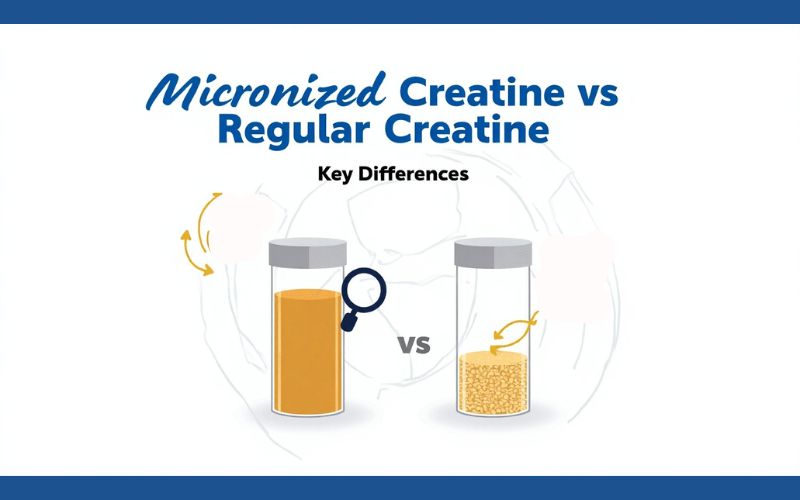Creatine is one of the most popular and extensively studied supplements in the fitness community. Whether you’re a seasoned athlete or someone just beginning their fitness journey, creatine supplementation is likely part of your routine. Known for enhancing strength, muscle mass, and exercise performance, creatine is used by many to achieve better workout results. However, there’s an ongoing debate about the best time to take creatine: pre-workout vs post-workout. In this article, we’ll dive into the science behind both approaches to help you make an informed decision about when to take your creatine.
Table of Contents
What is Creatine?
Creatine is a naturally occurring compound found in small amounts in foods like red meat and fish. It is also synthesized by the body in the liver, kidneys, and pancreas. Creatine plays a crucial role in producing ATP (adenosine triphosphate), the primary energy currency of the body. When you perform high-intensity exercises, such as lifting weights or sprinting, ATP is used rapidly to fuel muscle contractions. Supplementing with creatine helps replenish ATP stores, which can lead to improved strength, power, and overall workout performance.
The Benefits of Creatine Supplementation
Before we dive into the timing debate, it’s important to understand the benefits of creatine. Supplementing with creatine has been shown to:
- Increase Strength and Power: By replenishing ATP levels, creatine enhances your ability to perform high-intensity activities.
- Boost Muscle Mass: Creatine increases water retention in muscles, making them appear fuller, and over time, it can contribute to muscle growth.
- Enhance Recovery: Creatine helps reduce muscle damage and inflammation, promoting faster recovery after intense workouts.
The Best Time to Take Creatine: Pre-Workout vs Post-Workout
Pre-Workout Creatine: Boosting Performance
Many athletes and fitness enthusiasts opt to take creatine before their workouts, believing it will help them perform better during exercise. Here are some of the potential benefits of taking creatine pre-workout:
- Immediate Energy for Intense Exercise: Creatine is known for its role in ATP production. By taking creatine before your workout, you ensure that your muscles have an adequate supply of creatine phosphate to fuel high-intensity exercises. This can help improve your performance during activities like weightlifting, sprinting, or HIIT workouts.
- Enhanced Muscular Endurance: The energy boost from creatine can help you push through more reps and sets, increasing the overall intensity of your workout. This can lead to greater strength gains and muscle development over time.
- Improved Muscle Pump: Creatine has an osmotic effect, which means it draws water into muscle cells. This can result in a noticeable muscle pump during your workout, giving you a fuller appearance.
Post-Workout Creatine: Supporting Recovery and Muscle Growth
Taking creatine post-workout is another widely recommended option. Many athletes believe that post-workout creatine supplementation has unique advantages. Here’s why:
- Better Nutrient Absorption: After a workout, your muscles are primed to absorb nutrients. Insulin sensitivity increases, and muscles become more receptive to nutrients like creatine. When you take creatine post-workout, you maximize its absorption, helping replenish creatine stores more effectively.
- Muscle Recovery and Repair: The period following a workout is crucial for recovery. Creatine plays a role in reducing muscle soreness and aiding muscle repair. By taking creatine post-workout, you support the recovery process, helping to reduce fatigue and improve your overall muscle recovery time.
- Hydration and Electrolyte Balance: After intense exercise, your body may be depleted of fluids and electrolytes. Creatine draws water into muscle cells, helping to dehydrate and replenish electrolytes, which are vital for muscle function and overall health.
What Does Research Say About Creatine Timing?
The research surrounding the timing of creatine supplementation is not entirely conclusive. Some studies suggest that pre-workout creatine may enhance performance by providing an immediate energy boost, while others indicate that post-workout creatine is more beneficial for muscle growth and recovery. However, a study published in the Journal of the International Society of Sports Nutrition found that both pre- and post-workout creatine supplementation produced similar results in terms of strength gains and muscle mass increases over time.
Another study from the Journal of Strength and Conditioning Research found that taking creatine post-workout resulted in more significant gains in muscle mass, likely due to enhanced nutrient absorption. This suggests that while both approaches can work effectively, post-workout creatine might be more beneficial for muscle growth.
What Should You Choose: Pre-Workout or Post-Workout Creatine?
Ultimately, the best time to take creatine depends on your specific fitness goals. Here’s a quick summary of the two options:
- Pre-Workout Creatine: If your primary goal is to enhance performance during your workout, pre-workout creatine might be your best option. It can provide an immediate energy boost, allowing you to push harder and longer in your training session.
- Post-Workout Creatine: If you’re looking to improve recovery, support muscle growth, and maximize creatine absorption, taking creatine post-workout may be more beneficial.
For many individuals, the most effective approach might be to take creatine both pre- and post-workout, ensuring that your muscles are fully loaded with creatine at all times.
Combining Creatine with Other Supplements
Creatine is often combined with other supplements to enhance its effects. Some common combinations include:
- Creatine and Protein: Protein is essential for muscle repair and growth. When combined with creatine, it can help promote muscle recovery while creatine boosts performance.
- Creatine and Beta-Alanine: Beta-alanine helps buffer lactic acid in the muscles, improving endurance during intense workouts. Pairing it with creatine can further enhance workout performance.
- Creatine and Carbohydrates: Carbohydrates help increase insulin levels, which aids in creatine uptake. Taking creatine with a post-workout meal containing carbs may enhance creatine absorption and muscle recovery.
FAQs
1. Can I take creatine at any time of the day?
Yes, creatine can be taken at any time of the day. However, for optimal results, it’s recommended to take it either pre- or post-workout to maximize its effectiveness in performance and recovery.
2. How much creatine should I take daily?
The standard dose of creatine is 3-5 grams per day. Some individuals may begin with a “loading phase” of 20 grams per day for 5-7 days, followed by a maintenance phase of 3-5 grams daily.
3. How long does it take for creatine to show results?
Creatine generally takes about 1-2 weeks to fully saturate your muscles and start showing noticeable effects. However, some users report feeling an improvement in workout performance within the first few days.
4. Can creatine cause dehydration?
Creatine draws water into the muscles, so it’s important to stay hydrated while supplementing with creatine. Make sure you drink plenty of water throughout the day, especially during workouts.
Conclusion
The best time to take creatine depends on your personal goals. If you’re looking for an immediate boost in workout performance, taking creatine pre-workout may be the way to go. However, if your focus is on muscle recovery and growth, post-workout creatine supplementation could be more beneficial. Ultimately, consistency is key, and either timing strategy can help you reach your fitness goals over time.
If you’re ready to enhance your workouts and recovery with high-quality creatine, visit Nutritional World for premium supplements designed to support your fitness journey. Explore our range of products today, including creatine and other performance-enhancing supplements, to help you get the most out of your workouts.


























